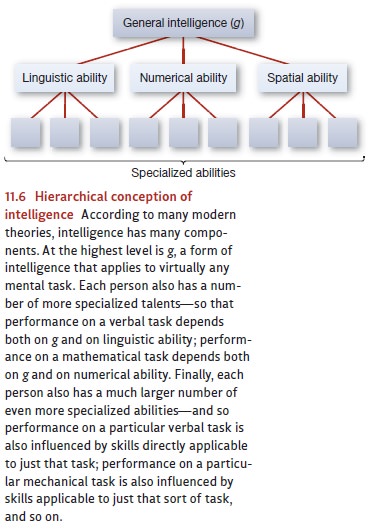Chapter: Psychology: Intelligence
Intelligence: Fluid and Crystallized G
Fluid and Crystallized G
Psychometric
analyses of intelligence also draw our attention to another distinction.
Alongside of verbal, quantitative, and spatial skills, we can also distinguish
two more forms of intelligence: fluid
intelligence and crystallized
intelligence, often abbreviated Gf
and Gc. These forms of intelligence
therefore take their place at the middle level of the hierarchy shown in Figure
11.6 (J. Carroll, 2005; Horn, 1985; Horn & Blankson, 2005).

Fluid intelligence refers to the ability to deal with
new and unusual problems. Itinvolves the deliberate and controlled use of
mental operations and is the form of intel-ligence you need when you have no
well-practiced routines you can bring to bear on a problem. Crystallized intelligence, on the other
hand, refers to your acquired knowl-edge. This includes your verbal knowledge
and your broad repertoire of skills—skills useful for dealing with problems
similar to those already encountered.
Fluid
and crystallized intelligence are linked in an obvious way: Someone with a high
level of fluid intelligence is likely to be a fast learner and so will easily
acquire the skills and knowledge that crystallized intelligence comprises. As a
result, someone with a lot of fluid intelligence will end up with a lot of
crystallized intelligence. Even so,
there are several reasons to distinguish these types of intelligence. For
example, crystallized intelligence seems to increase with age—as long as the
individual remains in an
intellectually stimulating environment. Fluid intelligence, on the other hand,
generally reaches its height in early adulthood and then, for most people,
declines steadily with age (Horn, 1985; Horn & Noll, 1994; Salthouse,
2004). Similarly, many factors—including alcohol consumption, fatigue,
depression, and some forms of brain damage—cause more impairment in tasks
requiring fluid intelligence than in those dependent on crystallized
intelligence (J. Duncan, 1994; E. Hunt, 1995). Thus, to put this concretely,
someone who is tired (or drunk, or depressed) will probably perform adequately
on tests involving familiar routines and familiar
facts because these tests draw heavily on crystallized intelligence. That same
individual, however, may be markedly impaired if the test requires quick
thinking or a novel approach—both earmarks of fluid intelligence.
Related Topics